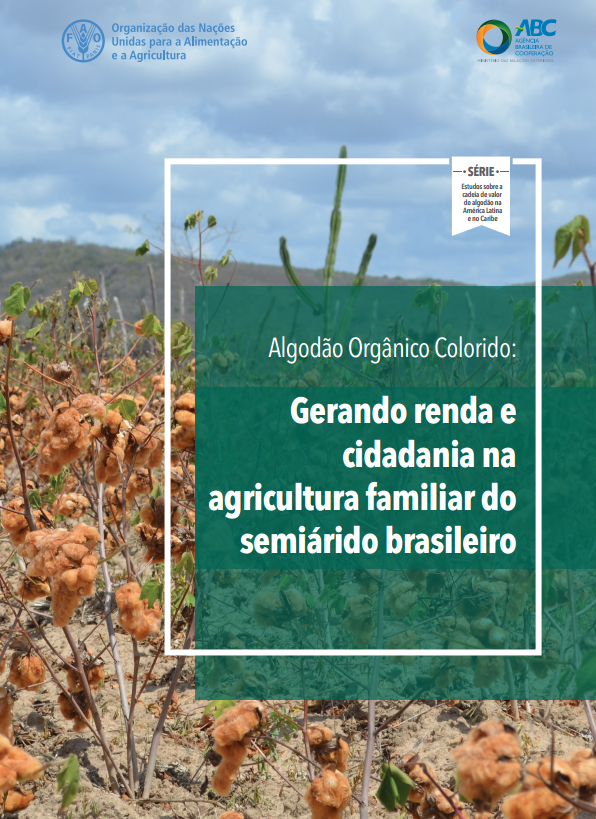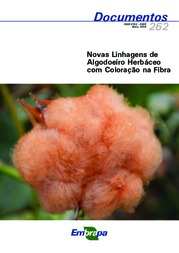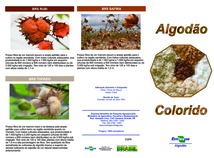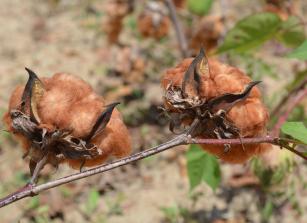FAO systematizes Brazilian experience in organic colored cotton production
FAO systematizes Brazilian experience in organic colored cotton production
Photo: Promotion

he material reports the experience of the cotton cultivation and of the transition into an organic production system by family farmers in the Margarida Maria Alves settlement
The production of organic colored cotton at the Margarida Maria Alves settlement, located in the city of Juarez Távora, in Paraíba's backland, has become a reference for growers in Brazil and several countries of Latin America and the Caribbean. To systematize such experience and contribute with the sharing of this production system, this month the Food and Agriculture Organization of the United Nations (FAO) and the Brazilian Ministry of Foreign Affairs' Brazilian Cooperation Agency (ABC/MRE) launched publication “Algodão Orgânico Colorido: Gerando renda e cidadania na agricultura familiar do semiárido brasileiro” (Organic Colored Cotton: Generating income and citizenship in the Brazilian semiarid family farming).
The work integrates a series of actions within the project Más Algodón (Strengthening the Cotton Sector through South-South Cooperation), a result of trilateral partnerships between the Brazilian government, FAO, and the governments of Argentina, Bolivia, Colombia, Ecuador, Paraguay, Peru and Haiti, with funds from the Brazilian Cotton Institute (IBA).
“This publication is part of a series of studies that aims at identifying, systematizing and disseminating practices and knowledge deemed relevant for family farming in the cotton sector in Caribbean and Latin American countries. The goal is to compose a set of technical and educational inputs that value and offer visibility to the experiences, techniques and know-how that contribute to the sustainability of thousands of family farmers and small agricultural businesses in such countries”, asserts FAO's regional coordinator of the Project Strengthening the Cotton Sector through South-South Cooperation, Adriana Gregolin.
The material reports the experience of the cotton cultivation and of the transition into an organic production system by family farmers in the Margarida Maria Alves settlement “This pioneering initiative in the Brazilian semiarid region provided positive responses to production, income and association challenges faced by such families, reflected in the organization and management of community associations, in environmental awareness, in the adoption of practices that facilitate coping with and the biological controlling cotton plant pests, and in the optimal use of water and soil, including organic fertilizers, crop rotation and integrated pest management”, highlights the specialist in South-South cooperation and FAO consultant Juliana Rossetto.
The study points to positive results in agroecologically-based cotton cropping of management practices that suit the family farming profile and of effective participatory research and rural extension action. Access to fair trade, with insertion in a verticalized organic system that integrates links from production to industry, in which farmers pre-process cotton in their own community, is another factor behind the success. “In this context, it is worth highlighting the role of Embrapa Cotton, which since 2000 has supported the experience of such farmer families”, Rosseto adds.
The main impacts of organic colored cotton production in the community include the generation of jobs and incomes and the improvement of families' quality of life. “Cultivating the organic cotton, when connected to a chain that links the producer to the consumer of ecologically correct products, can be a good alternative to improve income, even without the use of chemical inputs and in the presence of pests and climatic risk”, the FAO specialist states.
Twining and transforming: Justa Trama, the solidarity agroecological cotton chain
Another experience systematized by FAO as a Brazilian example of cooperative best practices in the organic cotton value chain was of the Justa Trama network. The network is composed by eight enterprises - cooperatives, associations and groups of self-managed workers -, distributed in several regions of Brazil, following the principles of solidarity economy and fair trade. “Justa Trama is a case of successful integration of the cotton value chain, from the crop through family farming to end consumers, and including the improvement, weaving, manufacture and trade. The end products are clothes and fabrics produced with organic, naturally-colored cotton”, she points out.
According to her, the network is committed to environmentally sustainable management practices that ensure dignified working conditions and gender equality. “The network was capable of generating brilliant results in that sense, by valuing work, rescuing self-esteem, offering professional training and improving the quality of life of family farmers and related workers”, she asserts.
The publications are available for download below (originals in Portuguese):
Algodão Orgânico Colorido: Gerando renda e cidadania na agricultura familiar do semiárido brasileiro
Tramando e transformando: Justa Trama, a cadeia solidária do algodão agroecológico
Translation: Mariana Medeiros
Edna Santos (MTB-CE 01700)
Embrapa Cotton
Press inquiries
algodao.imprensa@embrapa.br
Phone number: +55 83 3182-4361
Further information on the topic
Citizen Attention Service (SAC)
www.embrapa.br/contact-us/sac/




